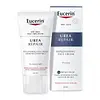What's inside
What's inside
 Key Ingredients
Key Ingredients

 Benefits
Benefits

 Concerns
Concerns

 Ingredients Side-by-side
Ingredients Side-by-side

Water
Skin ConditioningUrea
BufferingParaffinum Liquidum
EmollientDimethicone
EmollientPropylene Glycol
HumectantCetyl Alcohol
EmollientCetearyl Alcohol
EmollientCetearyl Ethylhexanoate
EmollientIsopropyl Myristate
EmollientHydroxyethyl Urea
HumectantPEG-8 Distearate
EmulsifyingGlyceryl Stearate
EmollientPhenoxyethanol
PreservativeParfum
MaskingPEG-100 Stearate
Caprylyl Glycol
EmollientAllantoin
Skin ConditioningTriethanolamine
BufferingCarbomer
Emulsion StabilisingTetrasodium Glutamate Diacetate
Hydroxyethyl Acrylate/Sodium Acryloyldimethyl Taurate Copolymer
Emulsion StabilisingPolyisobutene
PEG-7 Trimethylolpropane Coconut Ether
EmulsifyingHexyl Cinnamal
PerfumingLinalool
PerfumingWater, Urea, Paraffinum Liquidum, Dimethicone, Propylene Glycol, Cetyl Alcohol, Cetearyl Alcohol, Cetearyl Ethylhexanoate, Isopropyl Myristate, Hydroxyethyl Urea, PEG-8 Distearate, Glyceryl Stearate, Phenoxyethanol, Parfum, PEG-100 Stearate, Caprylyl Glycol, Allantoin, Triethanolamine, Carbomer, Tetrasodium Glutamate Diacetate, Hydroxyethyl Acrylate/Sodium Acryloyldimethyl Taurate Copolymer, Polyisobutene, PEG-7 Trimethylolpropane Coconut Ether, Hexyl Cinnamal, Linalool
Water
Skin ConditioningGlycerin
HumectantUrea
BufferingCetyl Alcohol
EmollientCaprylic/Capric Triglyceride
MaskingPentaerythrityl Tetraisostearate
EmollientTriisostearin
Skin ConditioningSodium Lactate
BufferingGlyceryl Stearate
EmollientArginine Hcl
Skin ConditioningDimethicone
EmollientPotassium Cetyl Phosphate
EmulsifyingXanthan Gum
EmulsifyingBiosaccharide Gum-1
HumectantLactic Acid
Buffering1,2-Hexanediol
Skin ConditioningPhenoxyethanol
Preservative
 Reviews
Reviews

Ingredients Explained
These ingredients are found in both products.
Ingredients higher up in an ingredient list are typically present in a larger amount.
Cetyl Alcohol is a fatty alcohol. Fatty Alcohols are most often used as an emollient or to thicken a product.
Its main roles are:
Though it has "alcohol" in the name, it is not related to denatured alcohol or ethyl alcohol.
The FDA allows products labeled "alcohol-free" to have fatty alcohols.
Learn more about Cetyl AlcoholDimethicone is a type of synthetic silicone created from natural materials such as quartz.
What it does:
Dimethicone comes in different viscosities:
Depending on the viscosity, dimethicone has different properties.
Ingredients lists don't always show which type is used, so we recommend reaching out to the brand if you have questions about the viscosity.
This ingredient is unlikely to cause irritation because it does not get absorbed into skin. However, people with silicone allergies should be careful about using this ingredient.
Note: Dimethicone may contribute to pilling. This is because it is not oil or water soluble, so pilling may occur when layered with products. When mixed with heavy oils in a formula, the outcome is also quite greasy.
Learn more about DimethiconeGlyceryl Stearate is a mix of glycerin and stearic acid.
It is used to stabilize the mixing of water and oil ingredients. By preventing these ingredients from separating, it can help elongate shelf life. It can also help thicken the product's texture.
As an emollient, it helps soften skin and supports barrier-replenishing ingredients.
In cosmetics, Glyceryl Stearate is often made from vegetable oils or synthetically produced.
This ingredient may not be fungal-acne safe
Fun fact: The human body also creates Glyceryl Stearate naturally.
Learn more about Glyceryl StearatePhenoxyethanol is a preservative that has germicide, antimicrobial, and aromatic properties. Studies show that phenoxyethanol can prevent microbial growth. By itself, it has a scent that is similar to that of a rose.
It's often used in formulations along with Caprylyl Glycol to preserve the shelf life of products.
Urea is also called carbamide and is the diamide of carbonic acid. In cosmetics, urea is used to hydrate the skin. It also provides exfoliation in higher concentrations.
As a humectant, urea helps draw moisture from the air and from deep within the skin. This helps hydrate your skin. Studies show urea is an effective moisturizer for dry skin conditions. 40% urea is typical in medications for treating eczema and other skin conditions.
Urea has the strongest exfoliation effect in concentrations higher than 10%. It is a keratolytic agent, meaning it breaks down the keratin protein in the top layer of skin. This helps remove dead skin cells and flaking skin.
In medicine, urea has been shown to help increase the potency of other ingredients, such as fungal treatments.
Humans and animals use urea to metabolize nitrogen-containing compounds. Urea is highly soluble in water. Once dissolved, it is neither acidic nor alkaline.
Learn more about UreaWater. It's the most common cosmetic ingredient of all. You'll usually see it at the top of ingredient lists, meaning that it makes up the largest part of the product.
So why is it so popular? Water most often acts as a solvent - this means that it helps dissolve other ingredients into the formulation.
You'll also recognize water as that liquid we all need to stay alive. If you see this, drink a glass of water. Stay hydrated!
Learn more about Water